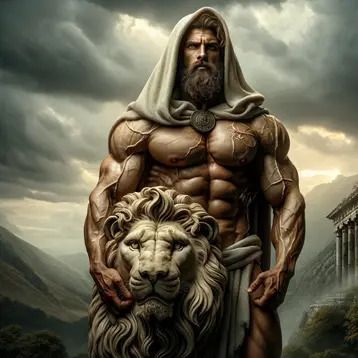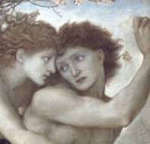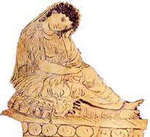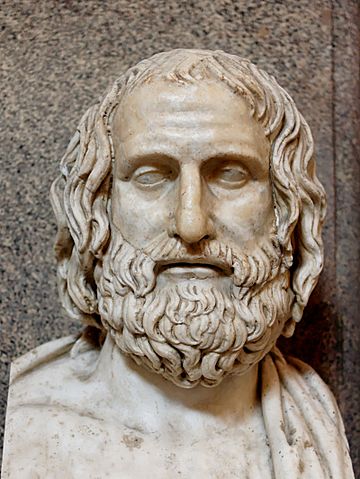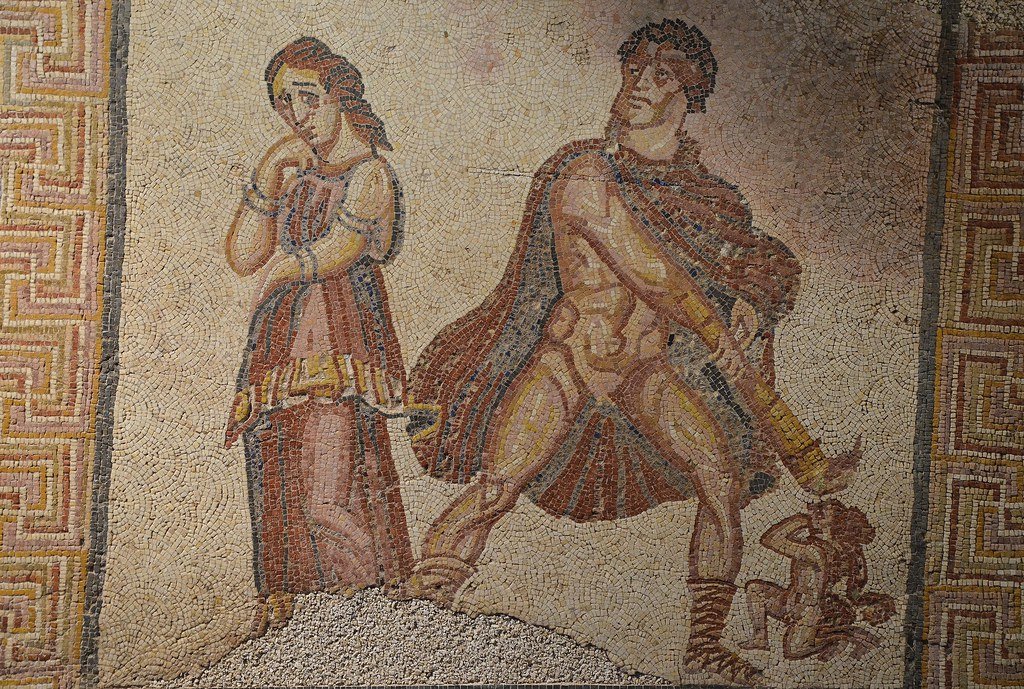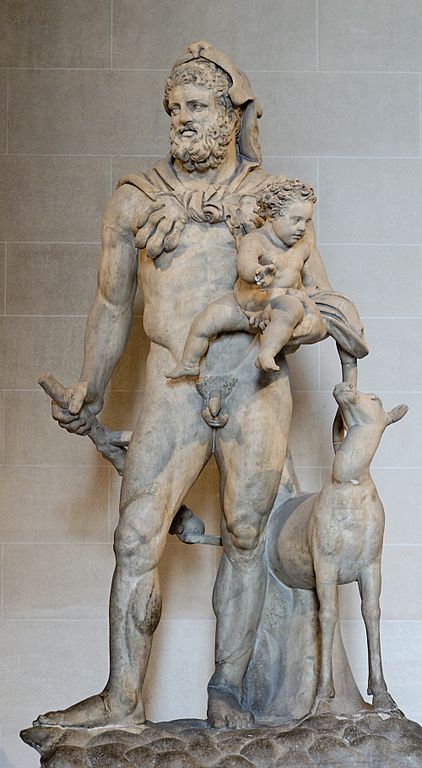
Children of Heracles
Children of Heracles by Euripides
First performed sometime around 430 BC, Children of Heracles is not only one of Euripides’ lesser-known works but, together with Andromache, Electra and even Hecuba, it is also often considered one of the author’s least successful plays. A patriotic work not unlike his later Suppliants, the tragedy is set before the temple of Zeus at Marathon, where the children of Heracles, led by the aged Iolaus—Heracles’ nephew and faithful companion on his labors—take refuge from their pursuer, Eurystheus, king of Argos, whose threats are relayed to them by his herald, Copreus. Sympathizing with their suffering, the old men Athens and their king, Demophon, chase away Copreus, but this causes a rift between Athens and Argos that can only be mended by war. According to an ancient prophecy, Athens can only win this war if a maid of noble blood is sacrificed to the gods, and Macaria, one of Heracles’ daughters, agrees to die for such an honorable cause. As a result of this sacrifice, Demophon and the Athenians win the war, during which Iolaus is miraculously rejuvenated, and Eurystheus is made captive. Demophon spares the life of Heracles’ archnemesis, but, surprisingly, Alcmene, Heracles’ mother, orders his execution. Eurystheus nobly accepts his death, prophetically claiming that, even though an antihero now, in an unexpected twist of fate, he will be the one to protect Athens from an invasion of the descendants of Heracles in the future (i.e., the Spartans).
Date and Historical Background
Since it is all but certain that the concluding verses of the play refer to the Peloponnesian War and Sparta’s invasion of Attica, Children of Heracles must have been performed sometime soon after 431 BC, most probably in 430 BC. The other plays from the supposed tetralogy—as well as the prize they won—are not known.
Characters and Setting
Characters
• Iolaus, a nephew and former companion of Heracles, now an old man
• Alcmene, mother of Heracles
• Macaria, daughter of Heracles
• Servant of Hyllus, Heracles’ brother
• Eurystheus, King of Argos
• Copreus, herald of Eurystheus
• Demophon, King of Athens, son of Theseus
• Acamas, brother of Demophon
• Messenger
• Chorus of Old Athenians (Men of Marathon)
Setting
Before the temple of Zeus at Marathon, near Athens.
Summary of Children of Heracles
Prologue
“Out of a sense of honor and because I reverenced the tie of blood,” says Iolaus, Heracles’ nephew and his long-time companion at the beginning of the play, “I more than any other shared with Heracles in his many labors while he was in our midst, though I could have lived at peace in Argos. And now, since he dwells in heaven, I keep safe beneath my wings these children of his, though I myself need someone to save me.” The problem is that after Heracles’ death, Eurystheus, the King of Argos and Heracles’ archnemesis, decided to kill all the remaining members of Heracles’ family—his numerous children and his mother, Alcmene. And that is what has brought them at the temple of Zeus at Marathon to ask for protection and asylum. Soon after they arrive, Copreus, Eurystheus’ herald, arrives as well, and orders Heracles’ children to leave the sanctuary and return to Argos, where “a stony justice” awaits them. To show the severity of his intent to not leave without them, he even pulls Iolaus away from the altar and knocks him onto the ground. Aged and helpless, Iolaus sees no way out but to ask for the help of his hosts.
Parodos (Entrance Song)
His cries are heard by several Athenian men (the Chorus) and immediately after they arrive at Zeus’ temple, they ask Iolaus why he is lying on the ground. “This man, strangers, dishonors your gods and drags me by force from the altar steps,” answers Iolaus, pointing his finger at Copreus. Next, he proceeds to introduce himself and Heracles’ family to the Chorus and explains how they have all come from Mycenae to Athens as suppliants. The Athenian men express their utmost sympathy, but Copreus warns them that Iolaus and Heracles’ family are owned by the Argive King, Eurystheus, and that offering them sanctuary is not a wise decision. The Chorus, however, says that a decision of that sort is neither for them nor for him to make and that everybody should respect the freedom of their country and, consequently, the will of their ruler, Demophon.
First Episode
Shortly after, Demophon, accompanied by his brother, Acamas, arrives at the temple to hear the pleas from the strangers. Even at first glance, he is touched by the state of Iolaus and not impressed with Copreus’ actions: “the clothing he wears and the shape of his garments is Greek, but these deeds are those of a barbarian hand.” Copreus and Iolaus present their cases in long monologues, and, after hearing them out, both the Chorus and Demophon are convinced that they must take Iolaus’ side and accept the Heraclids as suppliants, even if that means accepting a war against Athens as well. Demophon offers three reasons to justify his verdict. First of all, since Zeus is the protector of suppliants, he risks his wrath if he declines them hospitality. Secondly, because Heracles’ family is of noble origin it deserves to be treated nobly. And thirdly, because of fear of disgrace. “For if I am to allow this altar to be robbed by a foreigner,” says Demophon to explain this last reason, “it will be thought that it is no free land I govern but that I have betrayed suppliants for fear of the Argives. And that is nearly enough to make me hang myself.” Copreus doesn’t take this decision lightly. “I am going,” he says, “a single man can put up only a weak fight. But I shall return with a great force of Argive soldiers in full armor.” Iolaus expresses his gratitude to Demophon who, in turn and rather ominously, voices his confidence that this favor will never be forgotten by the children of Heracles. He leaves afterward to muster his army, organize his spies, gather his prophets, and make proper sacrifice before the impending war.
In the first stasimon, the Athenian men deem Copreus’ claims boastful and threaten that even though they prefer peace, if the Argive army attacks Athens, it will stand no chance against its brave citizens.
Second Episode
Soon after, Demophon returns to the temple and reports that the Argive army is already at the gates: he has seen them and their mighty leader, Eurystheus, with his own eyes. However, that is not the whole story: though he has prepared everything he should have, Demophon tells Iolaus of his fear that this is one war they might never win. “I gathered all the chanters of oracles into one place and closely examined their oracles,” he tells Iolaus. “On other points, these oracles showed many differences. But one thought shines forth from them all: they bid me to sacrifice a maiden to the daughter of Demeter, a maiden daughter of a noble father, to rout the enemy and save the city.”
As it can only be expected, Demophon is unwilling to sacrifice his own daughter and doesn’t want to ask any Athenian to do something he wouldn’t. Iolaus is devastated: “My children, I do not know what I am to do with you. Where shall we turn? What god's altars have we not garlanded? What land have we not come to as a bulwark? We shall be killed, my children, we shall be given over.” Desperate, Iolaus begs Demophon to do him a favor and hand him over to Eurystheus to save Heracles’ children, but Demophon refuses: as noble as this offer sounds, Eurystheus doesn’t want you, he says to Iolaus, but the Heraclids.
Having overheard Iolaus’ groans and sighs, one of Heracles’ daughters—often named Macaria—exits the temple to learn whether some new misfortune has befallen Iolaus and her siblings. “Fear no more the Argive enemy's spear,” she says, after finding all about the prophecy. “I am ready of my own accord and unbidden, to appear for sacrifice and be killed.” The city of Athens stood by them when they needed help, so why shouldn’t she do the same when it is in her power to save the city? Even though Iolaus rejects the offer and suggests that they should draw lots instead, Macaria is adamant. She says her last words and leaves to her death.
In the second stasimon, the Chorus consoles Iolaus, telling him that everybody is destined to die and that at least Macaria’s death is the most glorious one can imagine or wish for. “Her deeds were worthy of her father,” they sing, “worthy of her noble lineage.”
Third Episode
Just then, a servant of Hyllus, one of Heracles’ children, arrives at the temple and asks from Iolaus to speak to Alcmene, Heracles’ mother. He brings good news: Hyllus has returned and has set a camp outside town, all set to fight with the Athenians against Eurystheus. Having relayed the news, the servant prepares to leave for the battlefield, but unexpectedly, Iolaus expresses his wish to join him there. “It is most unlike you to utter such a foolish thought,” replies the Servant. “The strength you once had, my friend, is no more.” However, Iolaus is unyielding: he takes armor and captured weapons from the temple and leaves. Even Alcmene’s cries—who begs him to stay and protect her grandchildren—are not powerful enough to change his mind.
In the third stasimon, the Chorus prays to Zeus and Athena for help, hoping that Athens will emerge victorious from its war against Mycenae, “famed for its war-strength.”
Fourth Episode
Shortly after, a messenger arrives and brings a “most lovely” report to Alcmene: Athens has won convincingly and everyone she loves is still alive. And not only that: Hyllus and Iolaus were the bravest among the brave, the latter one miraculously—and thanks to the gods—becoming a young man yet again during the fight. It was this rejuvenated Iolaus who eventually managed to capture Eurystheus. Out of respect for Alcmene, he adds before leaving, Iolaus even spared the life of the Argive king so that Alcmene might see Eurystheus with her own eyes, cowering and trembling before her.
In the fourth stasimon, the Chorus celebrates the victory of Athens and gives gratitude to the gods, especially to Athena who must have helped Heracles’ children just as she had so many times helped their father.
Exodos (Exit Song)
Instructed by Hyllus and Iolaus, a servant brings Eurystheus before Alcmene. “Have you come, hateful creature?” exclaims Alcmene, full of anger and abhorrence. “Has Justice caught you at long last? Come, first turn your head towards me and steel yourself to look your enemies in the face: you are the ruled now, no longer the ruler.” Alcmene’s disgust is such that she threatens Eurystheus with “an evil death”: “we should be killing you, several times over,” she says, “since you caused us so many griefs.”
However, the servant warns Alcmene that such a thing is not allowed according to Athenian law, which strictly forbids for an enemy taken alive in battle to be killed in captivity. On finding out that no Athenian will put Eurystheus to death, Alcmene declares that, in that case, she will. Eurystheus accepts his fate almost indifferently: not only he is not afraid of dying, but he is also pretty sure that, in his death, he will become an even bigger man being an innocent victim of another one’s wrath. Moreover, he says, in death he is destined to become the protector of Athens from, surprisingly, none other than the descendants of Heracles.
“I shall lie for all time beneath the earth,” Eurystheus says to the old men of Athens in his final, cryptic words, “a foreign visitor who is kindly to you and protector of the city, but most hostile to the descendants of Heracles' children when they come here with a great army, betraying the kindness you showed them. That is the kind of guest-friends you protected… And you shall have a double profit from me: by dying I shall bring benefit to you and harm to the Heraclids.”
Despite Eurystheus’ speech, Alcmene orders his death. However, the Athenian men back away so that no guilt of this deed falls upon the head of their king and their city.
A Brief Analysis
Often criticized for its loose structure, Children of Heracles is fairly short (relative to other plays by Euripides and other tragedies written at the time) and may be missing a scene or two (for example, conventionally, one would expect a messenger to relay Macaria’s death in the middle of the play or to say something more about Eurystheus’ fate at its end). Be that as it may, the play deals with two things Euripides was very interested in throughout his career: the suppliant-motif and the motif of self-sacrifice. However, as some scholars have noted, the death of Macaria is the natural intersection and culmination of the exploration of these two themes, which renders the rest of the play rather superfluous. Consequently, Children of Heracles reads as if mashup of two plays, one focusing on the fate of the suppliants (with Macaria as the potential protagonist), the other on the political fate of contemporary Athens (with Eurystheus as the main character). It almost feels as if Euripides chose the wrong myth for a patriotic tragedy at a time when Athens needed one. It is difficult to see Eurystheus as something other than villain for the most part of the play, just as it is difficult to see the children of Heracles as something other than victims until Alcmene’s abrupt change of character at the end. However, it is difficult to see how this should suddenly make Eurystheus good or Athens proud in its protector. In fact, other than Macaria and Iolaus, there is arguably nobody worthy enough of sympathy in Children of Heracles, which is why, when all it’s sad and done, it is impossible to categorize some of its events as tragic or happy outcomes. But maybe that was Euripides’ plan all along with this play. Always the enfant terrible of the Ancient Greek stage, maybe Euripides wanted to purposefully blur the lines between the good and the bad, and to achieve something strikingly modern: instead of writing a patriotic play at a time of war, to reexamine the old myths and demonstrate that Athens is as much at fault for its misfortunes as are its enemies.
Children of Heracles Sources
There are many translations of Children of Heracles available online, both in verse and in prose; if you are a fan of the latter, you can read David Kovacs’ translation for Loeb Classical Library here. If, however, you prefer poetry, feel free to delve into Arthur S. Way blank verse adaptation here.
See Also: Euripides, Iolaus, Alcmene, Demophon, Heracles
Children of Heracles Video
Link/Cite Children of Heracles Page
Written by: The Editors of GreekMythology.com. GreekMythology.com editors write, review and revise subject areas in which they have extensive knowledge based on their working experience or advanced studies.
For MLA style citation use: GreekMythology.com, The Editors of Website. "Children of Heracles". GreekMythology.com Website, 09 Apr. 2021, https://www.greekmythology.com/Plays/Euripides/Children_of_Heracles/children_of_heracles.html. Accessed 20 April 2024.

